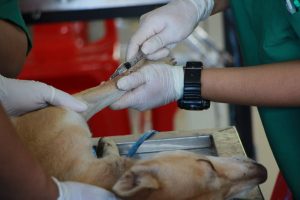Why Vaccines are Important for your Pet
There is no doubt, vaccines are a step towards a healthy immune system for your pet. They can also help prevent the spread of deadly and highly contagious diseases.
 Vaccines. Nobody likes them, not even our furry friends, but they are essential in keeping your pet healthy and ultimately happy.
Vaccines. Nobody likes them, not even our furry friends, but they are essential in keeping your pet healthy and ultimately happy.
See below as we list the recommended vaccines for cats and dogs. Please be aware that there are more available vaccines and depending on your pet’s lifestyle and where you live your vet can recommend any additional vaccines that would benefit your pet.
Recommended Vaccines for your Dog:
Parvovirus
The parvo vaccine protects against a deadly but common virus, especially in puppies, that is highly contagious through contact with infected animal stool. The virus attacks the intestines and causes severe diarrhea and vomiting which can lead to dehydration and death
Rabies
A fatal and incurable disease, the rabies virus attacks the nervous system of dogs that have been exposed to the saliva of an infected animal through an open wound or bite. Rabies vaccines should always be kept up to date
Distemper
This deadly contagious disease is caused by the virus CDV and has no cure. Distemper mostly affects puppies and attacks multiple systems including the respiratory and central nervous systems.
mostly affects puppies and attacks multiple systems including the respiratory and central nervous systems.
Recommended Vaccines for Your Cat:
Distemper
Feline Viral Rhinotracheitis, Calicivirus and Panleukopenia (FVRCP). Commonly called the “distemper” shot, this combination vaccine protects against three diseases: feline viral rhinotracheitis, calicivirus and panleukopenia (sometimes called “feline distemper”).
Rabies
This virus is fatal and all mammals, including humans, are susceptible to infection.
It is important to keep in mind that vaccinations take a few days to a few weeks to become effective, please ask your veterinarian for further details.
Be sure to call keep in touch with your vet to ensure all of your pet’s vaccines are kept up to date so that everyone stays happy and healthy.
Pet Vaccines FAQ:
Which dog vaccines are absolutely necessary?
Vaccines are a great way to immunize your pets against serious diseases and infections. According to the American Animal Hospital Association, dog vaccines are basically divided into two types; core vaccines and non-core vaccines. As far as the absolutely necessary vaccines are concerned, core vaccines are the obligatory ones. These include rabies, distemper, parvo and adenovirus. The non-core vaccines include canine influenza virus, bordetella, bronchiseptica etc and they are only injected into dogs that are at a risk. Also, take a look at more guidelines here.
What happens when you don’t vaccinate your dog?
Keeping your pet dog’s vaccination schedule up to date is extremely necessary or else the consequences could be hazardous. Not only your little fella will be affected but you would be at a high risk of developing an influenza-like disease too. Vaccines increase the life-span of the pets and help them lead a healthy and active life. If not vaccinated properly the dogs can develop many dangerous diseases like hepatitis, leukemia and rabies.
Can a dog die from vaccination?
As vaccines are killed (non-virulent) or altered microorganisms, they are likely to produce some reactions in your pet’s body after administration. Vaccines can cause mild lethargy to severe hypersensitivity (allergy) in dogs depending on the dog’s age and immunity. Young pups are more likely to get serious anaphylactic shocks and can die of an intense allergic reaction. Others may feel dull, vomit and develop diarrhea after the vaccine shots.
Do indoor dogs need vaccination?
It’s just a misconception that dogs that remain indoors are ok to not be vaccinated against infectious diseases. Owners that keep their dogs indoor should not completely be carefree towards their pets. Indoor dogs are, for sure, more healthy and disease-free as compared to the ones that roam around outside but that doesn’t make them less vulnerable to infections. So indoor dogs also need to be vaccinated as per the schedule.
